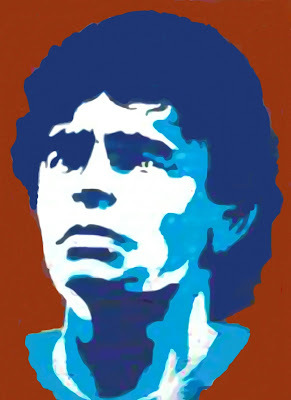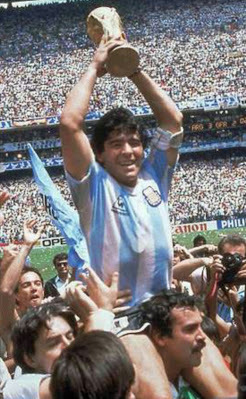Diego Maradona: The Genius of "The Beautiful Game"
 Argentine soccer legend Diego Maradona passed away from heart failure in his home in Greater Buenos Aires on November 25, less than a month after his 60th birthday.
Argentine soccer legend Diego Maradona passed away from heart failure in his home in Greater Buenos Aires on November 25, less than a month after his 60th birthday.I found out when I went to the webpage of the Italian newspaper Corriere Della Sera, in search of an article on a totally unrelated topic. The front page was covered with Maradona, above all that unforgettable image of his young face kissing the 1986 World Cup trophy.
"Ciao Diego, sei il calcio" the banner headline read. "Goodbye Diego, you ARE soccer" is the English equivalent. Note that this was an Italian newspaper eulogizing the star who was born thousands of miles and an ocean away in Latin America, and grew up in a poor, overcrowded barrio outside the city of Buenos Aires.
While his mother did come from Italian immigrants, his father was from the indigenous South American Guarani people (and Maradona was subjected to racist epithets from crowds and sometimes opposing players at various times in his career). But he played his best years of soccer in Italy's top professional league, leading Napoli from last place to two league championships and a UEFA Cup during the 1980s. His greatness on the pitch inspired a generation of fans and future players in both Italy and Argentina.
Nevertheless, his death — though it came as a surprise in the moment — was not, overall, something that was unexpected. In fact, Maradona had been suffering from many health problems, and had just returned from the hospital, where earlier this month he had surgery to remove a blood clot near his brain. His specific illnesses compounded the fact that his body was chronically, systemically exhausted. In a way it was a kind of "feat" that he made it as far as age 60, and no doubt he pushed himself all the way to the end.
In those 60 years, Maradona drove his body relentlessly, in ways that were beyond the limits of ordinary human endurance. In this time of mourning, we all prefer to look at the more admirable features of that drive: all the hard work, the training, the honing of his unique gifts, his explosive energy combined with brilliant ball control and unparalleled dribbling skills that outwitted his opponents again and again. For a dozen years he ruled the pitch in Argentina, Italy, and — in 1986 — the world. His amazing abilities, combined with his thorough intelligence of the game, made for a breathtaking spectacle, and brought a level of greatness to the 5'5" (168 cm) midfielder that goes beyond anything that can be measured by statistics.
His second goal against England in the 1986 World Cup quarterfinal made history for its speed and ball-control artistry and for the sheer genius by which he designed a path down the field, and then dribbled, feinted, fooled, and powered past five different (hopelessly burned) English players and then the goalie. This goal is widely considered to be the greatest in World Cup history. Five minutes earlier, Maradona's first goal in that quarterfinal displayed a different and more controversial facet of his "genius." As opportunity presented itself in rapid play in front of the English net, he flipped his head toward the ball while simultaneously punching it into the goal. There was nothing like on-the-field "replay review" in 1986, and the referee called it a good goal. Today the goal would have been challenged and overruled by the replay, which even in 1986 showed the involvement of Maradona's hand. All he said to reporters at the time, however, was that he hit it with his head and it must have been helped by "the hand of God." The notorious "Hand of God" goal seems more widely known in soccer mythology than the unparalleled moment of football perfection that scored the second goal 5 minutes later.
 During this period, Maradona was living a mythical life on many levels. Enormous stress came with his dedication to the perfection of his sport and his achievements as World Cup hero in Argentina and "Savior of Napoli" in the fiercely competitive Italian league.
During this period, Maradona was living a mythical life on many levels. Enormous stress came with his dedication to the perfection of his sport and his achievements as World Cup hero in Argentina and "Savior of Napoli" in the fiercely competitive Italian league. This stress weighed heavily on him, and he tried to "live up to" its strange intensity in other aspects of his life.
As noted above, Maradona was a driven man, but unfortunately too much of his drive was invested in an effort to be a "larger-than-life" man. He had attained an excessive stature as a celebrity during these years, and Naples — with all its natural beauty, expressive personality, and blissful chaos — was also a place of boundless excess in all manner of indulgence for those who could afford it. Off the pitch, Maradona drove his body harshly, with a wild lifestyle fueled by enormous quantities of cocaine and alcohol.
It's hard to say whether his glory years as a soccer player would have lasted longer were it not for his cocaine addiction. He was nearly 31 years old when he failed a drug test and was suspended from professional play for a year. Meanwhile, Naples grew tired of its "savior" — and this happens to every star and every celebrity no matter where they achieve their fame. Neapolitans are just louder and maybe a little more capricious about it



